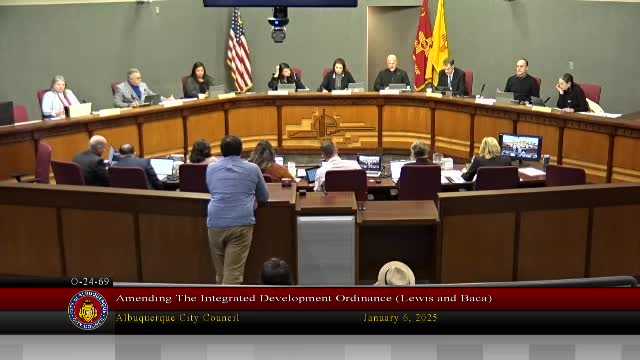Albuquerque council narrows appeal rules, eases multifamily development near transit in contentious IDO overhaul
Get AI-powered insights, summaries, and transcripts
Subscribe
Summary
The City Council voted 7-2 to amend the Integrated Development Ordinance, tightening who can appeal land-use decisions and allowing more multifamily development and higher buildings near major transit and Main Street corridors. The measure drew hours of public comment and multiple amendments before passage.
The Albuquerque City Council voted 7-2 to approve ordinance O-2469, a package of amendments to the city’s Integrated Development Ordinance (IDO) that changes who may appeal land-use decisions, clarifies the council’s authority to amend the IDO, and loosens some restrictions to encourage multifamily housing near transit corridors.
The changes include a new petition requirement for neighborhood associations to obtain standing for appeals (a signed majority of property owners within the two-block/660-foot notice area), a provision that would hold appellants financially responsible for appellees’ legal costs if the appeal fails, and language to allow multifamily development and relax height limits near premium transit and Main Street corridors. Councilor Brook Lewis sponsored the measure.
Why it matters: Supporters said the revisions reduce frivolous appeals that delay housing and other needed development, while opponents argued the changes dilute neighborhood voice and remove important procedural safeguards. The council approved the changes after extensive public comment and multiple floor amendments.
Supporters and opponents spoke at length. Councilor Lewis, sponsor of the ordinance, framed the package as an effort to increase housing supply and remove procedural barriers: “We need bold action to address Albuquerque’s housing crisis, and this is definitely a step in the right direction.” Several neighborhood association leaders and residents opposed the ordinance, saying the petition requirement and fee-shifting would effectively silence community groups and concentrate power with developers and the council. “This bill sidesteps the IDO to permit developer interest, prioritize construction of new multifamily or high-density housing along the corridor,” said James Shanley of the Mark Twain Neighborhood Association.
Council amendments pared and clarified language after public comment. The final package removed a draft provision that would have broadly exempted city-owned projects from the IDO, clarified tribal standing, allowed certain duplexes and townhouses in targeted zones, and added procedural safeguards on implementation timing and technology for tracking appeals. A late amendment narrowed where the unlimited-height exception would apply, excluding areas south of Central and west of the Rio Grande.
Outcome and votes: After debate and a failed attempt to delay final action, the council adopted O-2469 on a 7-2 vote. The ordinance passed with a slate of sponsor-led floor amendments intended to address several community concerns.
What’s next: The ordinance takes immediate effect per council rules for ordinance amendments; implementation details will be developed by planning staff and city departments. Several speakers and councilors urged further outreach and a detailed public information effort to explain the changes and how neighborhoods can comply with new petition rules.
Ending: The vote concludes a months-long, contentious effort to balance neighborhood protections with the city’s goal of building more housing along transit corridors. Supporters said the package will unlock sites for multifamily development near bus-rapid-transit and Main Street corridors; opponents vowed to monitor implementation and pursue additional review where they believe statutory or procedural rights were affected.
